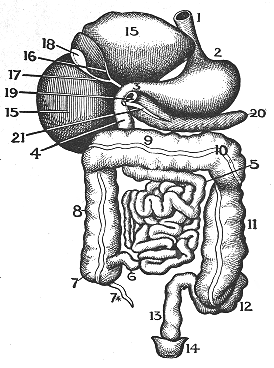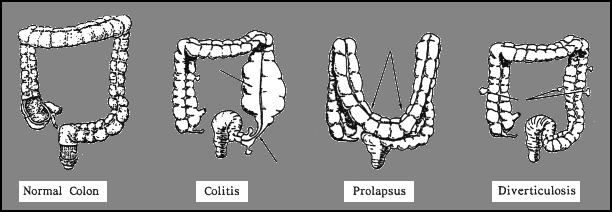
Toxic buildup in the intestines is a major cause of many diseases and health problems including: colds, weakened immune system, fatigue, loss of vitality, weight gain, acid indigestion, skin problems, brittle nails, hair loss, joint pain, allergies, headaches, circulatory and cardiac problems, and many many other diseases. Sluggish function of the lower intestine leads to irregularity, constipation, spastic colon, colitis, hemorrhoids, diverticilitis and diverticulosis. It can also have a serious effect on a person's nervous system! THIS
IS VITALLY IMPORTANT! TAKE A SERIOUS LOOK!

Poisons from a toxic colon...
Although we know how important fiber is in our daily diet, the foods we eat do not contain enough. The average American consumes 10 to 11 grams of fiber each day, but the recommended daily allowance is 25 to 40 grams. Compare a normal
colon with colons of 3 commonly known dysfunctions
NEARLY ANY DISEASE CAN BE DUE TO A TOXIC COLONAs unpleasant as it sounds, consider that a sluggish bowel can actually retain pounds of old toxic and poisonous fecal matter. 10-20 pounds is not unusual, and up to 65 pounds has actually been reported! Many times the real cause behind sickness and disease is this retention and reabsorption of built up toxic waste. The colon and digestive tract of nearly every adult is burdened with a lifetime of accumulation of toxic waste materials. The very best diets can be no better than the worst if the sewage system of the colon is clogged with a collection of accumulated wastes. It is impossible when we eat two, three or more times a day, not to have residue accumulating in the colon in the form of undigested food particles, as well as the end product from food that has undergone digestion. Not only does food-waste accumulate in the colon, but also the millions of cells and tissues from our bodies which have served their purpose and have been replaced. If a person has eaten processed, fried, and over-cooked foods, devtalized starches, sugar, and excessive amounts of salt, his/her colon cannot possibly be efficient even if he/she has a bowel movement two or three times a day. Instead of furnishing nourishment to the nerves, muscles, and cells and tissue of the walls of the colon, such foods can actually cause starvation of the colon. A starved colon may let a lot of fecal matter pass through it, but it is unable to carry on the last of the digestive and nourishing processes and functions intended for it. Infirmity and sickness at any age, is the
direct result of loading the body with food which contains no vitality,
and at the same time allowing the intestines to remain loaded with waste
matter.
|

